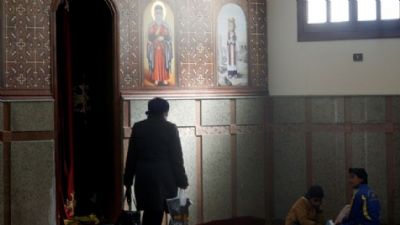The Coptic Christian community of Egypt's Sinai Peninsula is under siege from a growing number of militant Islamists, including ISIS members, who target them for death because of their faith.
The Sinai Peninsula --where northeastern Egypt shares its borders with Gaza and Israel-- has been the center of an ongoing conflict between Islamists and Egyptian forces for years, but in recent times the Islamic State and their local affiliates known as the "Sinai Province," have been attempting to drive the Coptic population out of the northern Mediterranean city of Al Arish.
While the Christian population of this city has had to flee from threats before, their plight has taken a dark turn in 2017. With a recent call from ISIS for the Copts on the peninsula to be killed; over 100 families had to flee amid attacks and even the executions of their loved ones.
"I was born in Al Arish. It is my home. I hope that they [ISIS] do not take over the city."
- Monica
"My whole life is in Al Arish," said Monica, a college student whose family is from Al Arish. "My friends. My church. Everything. All of my life is there."
Monica, who asked that that her surname not be published, was forced to flee Al Arish along with her family after ISIS fighters threatened to kill her brother-simply because he was Christian.
"We were frightened. We thought some people had tried to enter our home to kill my brother," she said. "I have no words to describe the feeling."
Egypt's Coptic Christians, who make up around 10 percent of the population, have long been a target of Islamic extremists. Attacks on churches by Muslim mobs increased since the 2013 military coup that ousted an Islamist preisdient, Mohamed Morsi.
Christians overwhelmingly supported the army chief-turned-president, Abdel-Fattah el-Sissi, and extremists have used such support as a pretext to increase attacks against them.
Christians in northern Sinai have been fleeing in droves in recent years because of the militant threats, and the community that before 2011 numbered up to 5,000 has now dwindled to fewer than 1,000, according to The Associated Press. There are no official statistics on the number of Christians in cities or across the country.
The displacement underscores what many human rights activists have said about the failure of the Egyptian government in providing the minimum level of security to the Christians in this volatile region of northern Sinai, where the military has been battling for years against militants.
But this recent wave of threats against the Copts of the northern Peninsula has proven to be the most deadly.
ISIS recently released a video in which they call for "fellow jihadists" to murder the Coptic Christians of Al Arish which they refer to as their "favorite prey."
In the 20-minute video, ISIS claims responsibility for the January bombing of the central Coptic church in Cairo that killed nearly 30 people, saying that it was only the beginning.
The video shows footage of Egypt's Coptic Christian pope, Christian businessmen, judges and priests who either speak of the need to protect the minority or use derogatory terms to refer to Egypt's Muslim majority. The narrator says Christians were no longer "dhimmis," a reference to non-Muslims in Islam who enjoy a degree of state protection. Instead, the group describes the Christians as "infidels" who are empowering the West against Muslim nations.
"God gave orders to kill every infidel," one of the militants carrying an AK-47 assault rifle says in the video.
In February, a Coptic man and his son were found killed after their bodies were found dumped behind a state-run language school in Al Arish.
Saied Hakim, 65, and his 45-year-old son Medhat Saied were believed to have been kidnapped by members of the Sinai Province, according to Daily News Egypt.
Saied was shot in the head while his son was burned alive.
One week earlier, a veterinarian was assassinated by militants as he was leaving private clinic in a suburb of Al-Arish. He was met with a hail of gunfire as he was leaving work for the day.
In January, a full-scale attack by militants killed 30 soldiers and injured at least 15 residents. A suicide bomber apparently drove a water tanker truck filled with explosives in a military camp in Al- Arish, killing dozens of soldiers and injuring civilians in the area that were hit with shrapnel.
Monica and her family-like many others in the community-- fled the city after the violent incidents increased. She says that seven people were executed by militants just last month, including her friend's father. She says that they were senselessly killed for their faith.
Monica's family and many others from Al Arish have sought refuge in the city of Ismailia, about six hours from Al Arish. She is hopeful that they will all be able to return home.
"I was born in Al Arish. It is my home," she said. "I hope that they [ISIS] do not take over the city."
March 6, 2017
ISIS Murdering Coptic Christians on Egypt's Sinai Peninsula Over Faith
Date
March 6, 2017
Title
ISIS Murdering Coptic Christians on Egypt’s Sinai Peninsula Over Faith,
Fox News
Author(s)
Perry Chiaramonte
Original Source

